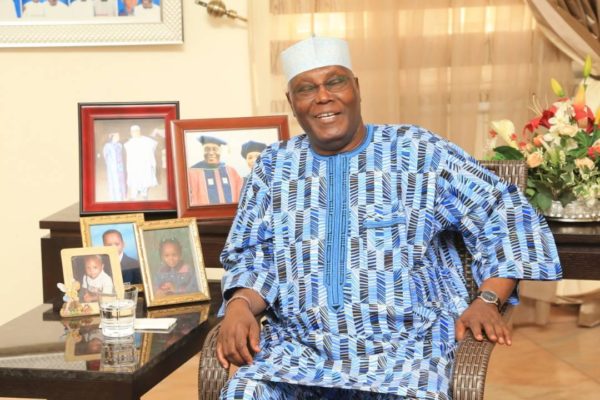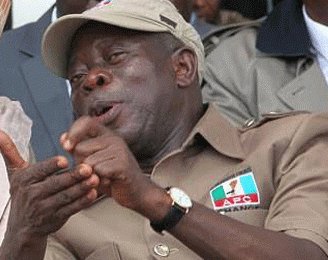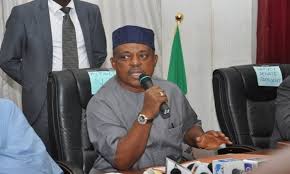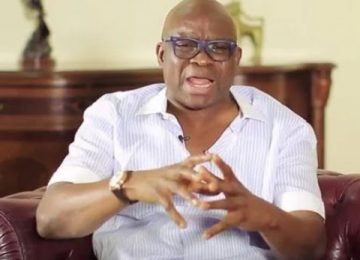Former Vice President Atiku Abubakar has announced his formal return to the Peoples Democratic Party (PDP).
He did the switch in the format of the information age: by announcing it Live on Facebook on Sunday following what he called his consultations with party leaders and stakeholders from across the country.
Atiku was a member of the All Progressives Congress until last week when he announced his departure. The party said he would not be sorely missed. The PDP has a national convention scheduled for 9 December in Port Harcourt.
He read a statement live on Facebook and photographs later distributed by the Atiku Media Office showed the former Vice President fiddling with his smartphone as he responded to questions from his Facebook followers.
Atiku, who is very active in the social media, including Twitter has 580,111 people following him on Facebook. On Twitter, he has 1.06m followers, which is below the fan base of Vice President Yemi Osinbajo who has 1.32m followers on Twitter alone. He has another 432,000 on Facebook, about 150,000 lower than Atiku’s fan base.
On Twitter, Atiku told his followers to check him out on Facebook as he was ‘making an important announcement”.
The live announcement had garnered just 24,000 views at about 5pm.(Watch the video here)
Atiku’s statement went thus:
“Hello, my name is Atiku Abubakar.
I am speaking to you today on Facebook Live as I want to reach as many of our young people as possible as I have an important announcement to make about the future of Nigeria.
As it is you, our youths, who represent the future of our nation.
I have found in my travels across the country that whenever I get into conversations with young people their number one concern is whether they will be able to get a job for without a job they have no means of sustaining themselves or begin a family.
And without the security of a job we cannot have security in our country.
So without jobs there is no future for you or for Nigeria.
And I also know as a parent that the older generation is also concerned about jobs for their children and, too often today, for themselves as well.
Creating jobs is something I know about as I have created over 50,000 direct jobs and 250,000 indirect jobs in my own State of Adamawa.
And I also know how the Government can help create the right environment for businesses to create jobs. When I was Vice President in 1999 I was responsible for liberalising the telecoms sector which enabled us to increase the number of people who could access a phone from less than 1 million then to over 100 million today.
This transformation resulted in the creation of hundreds of thousands of new jobs from the top-up card vendors you see on every street corner to the many new businesses that fed off the mobile phone revolution.
Some of you may know that I was elected Vice President under the banner of the PDP, which is the political party I had helped to found some ten years before.
And some of you may also know that I left the PDP four years ago when I believed it was no longer aligned to the principles of equity, democracy and social justice upon which we had founded it.
I joined the APC as I had hoped it would be the new force that would help improve life for our people and I was excited about the party’s manifesto to create three million new jobs a year.
The result has not been the change people had been promised or voted for, as in the last two years almost three million Nigerians have lost their jobs.
And today with a record 25 percent of people aged 18-25 unemployed I can see how difficult it is for our youths to find a job.
The key to creating jobs is a strong economy and that is what we are currently lacking.
So today I want to let you know that I am returning home to the PDP as the issues that led me to leave it have now been resolved and it is clear that the APC has let the Nigerian people, and especially our young people, down.
The declaration was followed by some questions posed online by several fans.
The first shot was how could deal with the problem of Nigerian youths when he is over 70 years old.
His response: I meet young people every day. I have children and grandchildren and most of my employees are youths.The key to knowing what young people want is to listen to them. I’m good at that. Sometimes when I am on the phone with my kids they ask me are you still there, because I just listen to them without interrupting. Young people are on social media and so I go there. They tell me that their number one challenge is jobs.
Terrorism, militancy, kidnapping, and other forms of exuberance they may lead to criminality are a symptom of the disease of joblessness.
Once you can get Nigeria working again and get Nigerians working again, youth restiveness will ease and gradually disappear,” he concluded.





